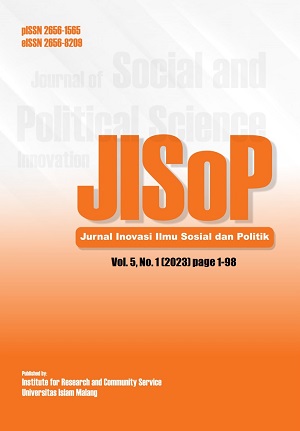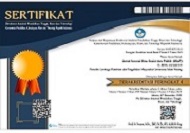Foreign policy and science: Switzerland actions to address the climate crisis effects in the arctic through the arctic council
DOI:
https://doi.org/10.33474/jisop.v5i1.19746Keywords:
arctic council, foreign policy, science, SwitzerlandAbstract
like to have limited social-economy material advantage, Switzerland's action to actively and continuously participate in the Arctic Council is an interesting topic to discuss. Existing literature has captured Switzerland's actions to fight against the climate crisis, yet missed to address why it carried to participate in the Council amidst likely-limited materialistic returns. Deploying Foreign Policy Analysis and Resources Based Theory of Soft Power as an analytical approach and qualitative approach, this study argues that Switzerland's Foreign Policy which specifically emphasizes action in climate protection and global environment is the reason behind its active participation in various global communities, including in the Arctic Council. Interestingly, Switzerland utilizes science as an instrument of diplomacy and constructs its identity as a global science policy advisor in the environmental sector. Thus, the global climate crisis issues have been an opportunity for Switzerland as a small power to enhance its bargaining position in international politics through science as a soft power.
References
Anadza, H. (2019). Dominasi Kedaulatan Negara dalam Integrasi Pemerintahan Uni Eropa: Penolakan Yunani Terhadap Pengungsi Syria. Jurnal Inovasi Ilmu Sosial Dan Politik (JISoP), 1(2), 157–166. https://doi.org/10.33474/jisop.v1i2.4803
Aprianto, A. (2020). Sains sebagai Sumber Soft Power Indonesia [Science as a Source of Soft Power for Indonesia]. Jurnal Politica Dinamika Masalah Politik Dalam Negeri Dan Hubungan Internasional, 11(1), 85–105. https://doi.org/10.22212/jp.v11i1.1444
Arctic Council. (n.d.). Switzerland | Arctic Council. https://arctic-council.org/about/observers/switzerland/
Ashraf, N., Knaepen, H., Seters, J. van, & Mackie, J. (2020). The integration of climate change and circular economy in foreign policies. Ecdpm. https://ecdpm.org/work/the-integration-of-climate-change-and-circular-economy-in-foreign-policies
Beniston, M. (2012). Impacts of climatic change on water and associated economic activities in the Swiss Alps. Journal of Hydrology, 412–413(4), 291–296. https://doi.org/10.1016/j.jhydrol.2010.06.046
Bintanja, R. (2018). The impact of Arctic warming on increased rainfall. Scientific Reports, 8(1), 1–6. https://doi.org/10.1038/s41598-018-34450-3
Bryman, A. (2016). Social Research Methods (5th ed.). Oxford University Press.
Casado-Asensio, J., & Steurer, R. (2016). Mitigating climate change in a federal country committed to the Kyoto Protocol: how Swiss federalism further complicated an already complex challenge. Policy Sciences, 49(3), 257–279. https://doi.org/10.1007/s11077-016-9247-z
Country Index. (n.d.). Notre Dame Global Adaptation Initiative. https://gain.nd.edu/our-work/country-index
Creutzburg, L., & Lieberherr, E. (2021). To log or not to log? Actor preferences and networks in Swiss forest policy. Forest Policy and Economics, 125, 1–12. https://doi.org/10.1016/j.forpol.2021.102395
Desthieux, G., & Joerin, F. (2022). Urban planning in Swiss cities has been slow to think about climate change: why and what to do? Journal of Environmental Studies and Sciences, 12(4), 692–713. https://doi.org/10.1007/s13412-022-00767-9
Eriksen, C., & Hauri, A. (2021). Climate Change in the Swiss Alps. CSS Analyses in Security Policy, 290, 1–4. https://doi.org/10.3929/ETHZ-B-000496457
Fitriani, E., Mantong, A. W., Intarti, Y. R., Kusumasomantri, A. R., & Tamzil, C. F. (2016). Konflik dan Kerja Sama di Kutub Utara dalam Perspektif Indonesia. PT. Raja Grafindo Persada.
Graf, A., & Lanz, D. (2013). Conclusions: Switzerland as a paradigmatic case of small-state peace policy? Swiss Political Science Review, 19(3), 410–423. https://doi.org/10.1111/spsr.12048
Hermann, A. T., Hogl, K., & Pregernig, M. (2017). Science–policy interactions in Austrian, Dutch, and Swiss climate policy: a comparative account. Journal of Environmental Policy & Planning, 19(2), 168–182. https://doi.org/10.1080/1523908X.2016.1180238
Hudson, V. M., & Day, B. S. (2019). Foreign Policy Analysis Classic and Contemporary Theory (3rd ed.). Rowman & Littlefield.
Ingold, K., & Fischer, M. (2014). Drivers of collaboration to mitigate climate change: An illustration of Swiss climate policy over 15 years. Global Environmental Change, 24, 88–98. https://doi.org/10.1016/j.gloenvcha.2013.11.021
Jorio, L. (2021). Switzerland has a role to play in the Arctic. SWI Swissinfo.Ch. https://www.swissinfo.ch/eng/business/rotte-commerciali-e-risorse_switzerland-has-a-role-to-play-in-the-arctic/46348358
Kammermann, L., & Dermont, C. (2018). How beliefs of the political elite and citizens on climate change influence support for Swiss energy transition policy. Energy Research & Social Science, 43, 48–60. https://doi.org/10.1016/j.erss.2018.05.010
Lee, G. (2009). A theory of soft power and Korea’s soft power strategy. Korean Journal of Defense Analysis, 21(2), 205–218. https://doi.org/10.1080/10163270902913962
Lüth, M., & Schaffer, L. M. (2022). The electoral importance and evolution of climate-related energy policy: evidence from Switzerland. Swiss Political Science Review, 28(2), 169–189. https://doi.org/10.1111/SPSR.12520
Marcucci, A., & Turton, H. (2012). Swiss Energy Strategies under Global Climate Change and Nuclear Policy Uncertainty. Swiss Journal of Economics and Statistics, 148(2), 317–345. https://doi.org/10.1007/BF03399369/METRICS
Matasci, C., Kruse, S., Barawid, N., & Thalmann, P. (2014). Exploring barriers to climate change adaptation in the Swiss tourism sector. Mitigation and Adaptation Strategies for Global Change, 19(8), 1239–1254. https://doi.org/10.1007/S11027-013-9471-1/FIGURES/4
Noruzi, E., Kushki, R. M., & Mashayekh, J. (2020). Iran and Strategic Multilateralism Based on Science Diplomacy : A Comparative Study of the Presence of Iran, Turkey, Saudi Arabia and Malaysia in International Science and Technology Organizations. Political Science, 23(89), 121–158. https://doi.org/10.22081/psq.2020.69263
Panos, E., & Kannan, R. (2018). Challenges and opportunities for the swiss energy system in meeting stringent climate mitigation targets. Lecture Notes in Energy, 64, 155–172. https://doi.org/10.1007/978-3-319-74424-7_10/COVER
Pfister, R. (2019). Scientific Policy Advice in Switzerland: A Case Study on Climate Change and General Insights. European Review, 27(1), 33–40. https://doi.org/10.1017/S1062798718000492
Riazi, S. A., Baghestan, A. G., Ideris, A., Khaniki, H., Akhtari-Zavare, M., & Farahmand, E. (2019). Science and Technology Diplomacy and the Power of Students: The Case of Iranian Student in Malaysia. Pertanika Journal of Social Science and Humanities, 27(1), 649–662. http://www.pertanika.upm.edu.my/
Sager, F., Bürki, M., & Luginbühl, J. (2014). Can a policy program influence policy change? The case of the Swiss EnergieSchweiz program. Energy Policy, 74, 352–365. https://doi.org/10.1016/j.enpol.2014.07.005
Savelsberg, J., Schillinger, M., Schlecht, I., & Weigt, H. (2018). The Impact of Climate Change on Swiss Hydropower. Sustainability (Switzerland), 10(7). https://doi.org/10.3390/su10072541
Seidl, R., Wirth, T. von, & Krütli, P. (2019). Social acceptance of distributed energy systems in Swiss, German, and Austrian energy transitions. Energy Research & Social Science, 54, 117–128. https://doi.org/10.1016/j.erss.2019.04.006
Sharp, G. (2019). The Swiss Arctic Policy Draw Parallels Between the High Altitude of the Alps and the Arctic. High North News. https://www.highnorthnews.com/en/swiss-arctic-policy-draw-parallels-between-high-altitude-alps-and-arctic
SJR. (n.d.). International Science Ranking. https://www.scimagojr.com/countryrank.php
Sliwa, Z., & Aliyev, N. (2020). Strategic Competition or Possibilities for Cooperation Between the United States and Russia in the Arctic. The Journal of Slavic Military Studies, 33(2), 214–236. https://doi.org/10.1080/13518046.2020.1763132
Vorkauf, M., Marty, C., Kahmen, A., & Hiltbrunner, E. (2021). Past and future snowmelt trends in the Swiss Alps: the role of temperature and snowpack. Climatic Change, 165(44), 1–19. https://doi.org/10.1007/s10584-021-03027-x
Downloads
Published
How to Cite
Issue
Section
License
Copyright (c) 2023 Ferga Aristama, Fredy Buhama Lumban Tobing

This work is licensed under a Creative Commons Attribution-ShareAlike 4.0 International License.
.



_-_Copy.jpg)





